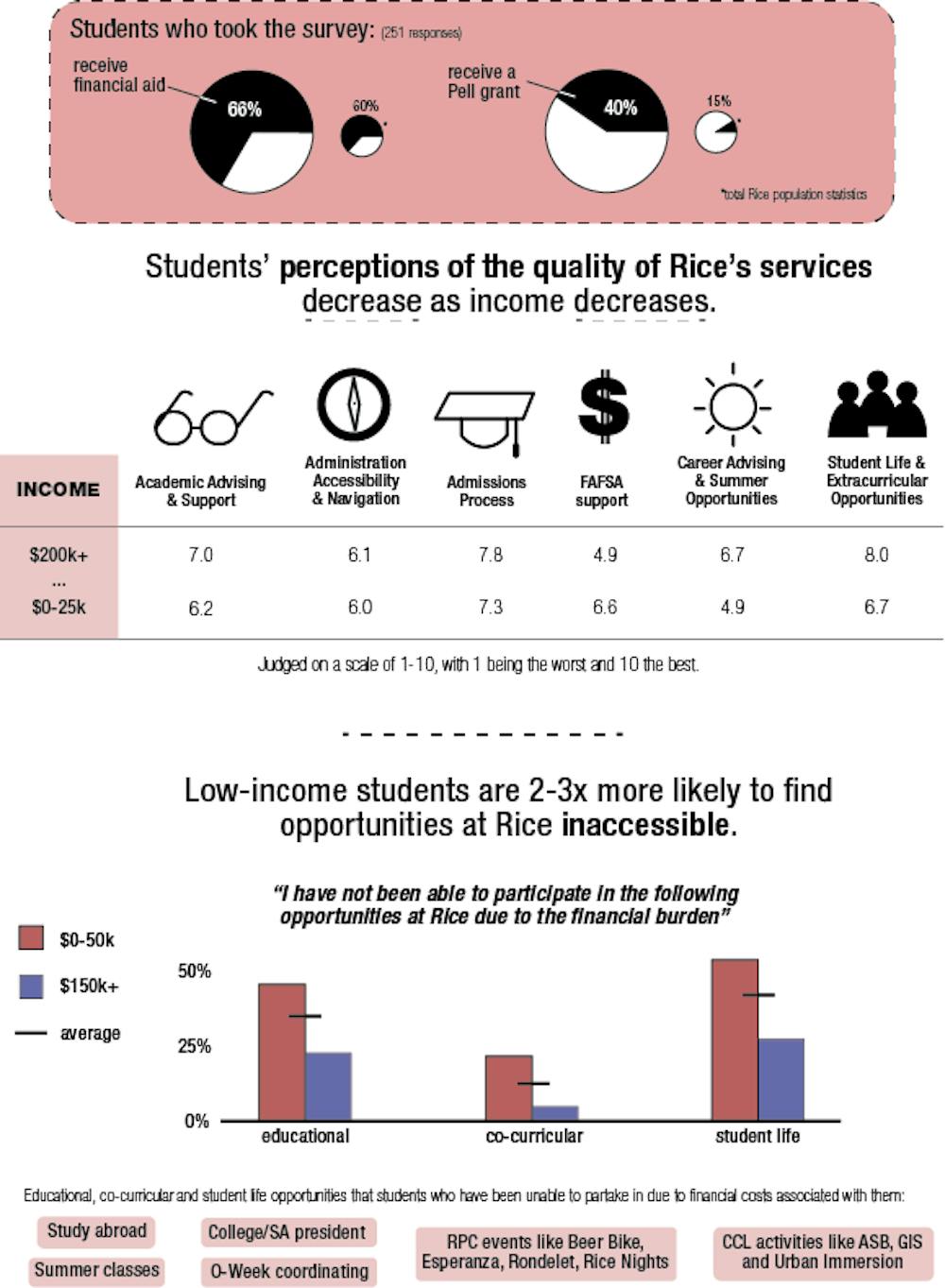Is the Rice experience accessible?
SA report: Low-income students face barriers participating in opportunities at Rice

A new report from the Student Association shows that nearly 60 percent of students with a household income of less than $50,000 have been unable to participate in Rice events like Beer Bike or Center for Civic Leadership activities such as Alternative Spring Break due to their associated financial burden.
The Student Access and Success Report, released this month, also found students’ perceptions of the quality of campus resources such as career advising and extracurricular opportunities to decrease with decreasing income. However, awareness of resources was fairly constant between students of differing income levels.
Lower-income students were two to three times more likely to find educational, student life and leadership opportunities to be cost-prohibitive. These include study abroad programs, Global Urban lab courses which have a fee of several thousand dollars for travel, Rice Program Council events and unpaid college leadership positions such as president or Orientation Week coordinator.
According to SA President Griffin Thomas, who created the Student Access and Success task force last October, the report reveals a disconnect between Rice’s curricular and extracurricular education models, and funding provided to support these.
“Rice prides itself on having extracurricular opportunities available to students that have become part and parcel of the Rice undergraduate curriculum,” Thomas, a Lovett College senior, said. “At the same time, we’re only providing financial aid to explicitly academic programs.”
Generation College President Alberto Maldonado said he found the report to be fairly comprehensive. Generation College is a club for students who are of the first-generation in their family to attend or graduate from college.
“This report finally points out real problems that many first-gens and low-income students face,” Maldonado said. “I do wish it gave more specific details about high school experiences considering the first-gen [and] low-income background can vary a lot.”
Maldonado said he agreed that career advising and summer opportunity programs seem to lack a focus on first-generation and low-income students at Rice.
“With parents never attending a four-year university in the U.S., much less an elite one such as Rice, our demographic often gets introduced to jobs, majors, focuses and opportunities that we would have never known about without our own research and our own luck,” Maldonado said.
He also said low-income students face barriers with unpaid internships, expensive courses and paying for summer classes, all of which the report presented as issues as well.
The task force surveyed the student body in February and received 251 responses. Respondent demographics were biased toward lower-income students, although students at all income levels responded to the survey.
Thomas then invited students who expressed interest in the project, as well as those in organizations such as Generation College, to attend a focus group in April to enhance and elaborate on the survey responses.
“[The focus group] was another way to make sure that what we were getting in the report was actually the lived experiences of the population we were trying to evaluate,” Thomas said.
Thomas said Rice administration has demonstrated its investment in supporting low-income students through initiatives such as the CCL’s scholarship funding for ASB programs or the Center for Career Development’s funding for unpaid internships.
According to Thomas, meal plan accessibility, including varying plan options and introducing Saturday night dinner on campus, are a few changes students might see in the coming year.
“We want to make sure students aren’t hungry on Saturday nights or aren’t forced to make some unfortunate choices when it comes to dining,” Thomas said. “We want to make sure that stressor is removed for students.”
Thomas also suggested scholarship funding for extracurricular programs may expand across campus. However, Thomas does not expect college leadership positions to become paid positions in the near future because only a small percentage found these to be cost-prohibitive.
Maldonado said he hopes Rice will make an effort to allocate money towards students who can’t afford programs to give them an equal chance at having the unique Rice experience.
“If Rice made a collective effort to attack these specific problems, this demographic could really stride to being the last first- or last low-income generation of their family,” Maldonado said.
More from The Rice Thresher

Rice to support Harvard in lawsuit against research funding freeze
Rice, alongside 17 other research universities, requested a federal judge for permission to file an amicus curiae brief in support of Harvard University’s lawsuit against the Trump administration over more than $2 billion in frozen research grants.

Mayor Whitmire discusses ‘the state of Houston’ between audience protests at Baker Institute
John Whitmire’s remarks on the city’s budget, transportation and infrastructure were interrupted twice by shouts from audience members at a Baker Institute event May 29. At the event, which was open to the public, Whitmire spoke about the current state of Houston alongside former county judge Ed Emmett.
Rice reaffirms support for international students after Trump administration targets Harvard
Rice and the Office of International Students and Scholars said in a May 23 email that they are monitoring the Trump administration’s actions towards Harvard to bar the school from enrolling international students. A federal judge temporarily halted the move less than 24 hours later.


Please note All comments are eligible for publication by The Rice Thresher.